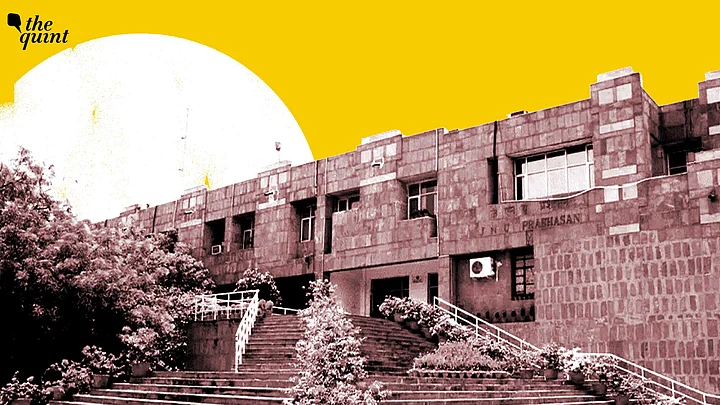Hunger strikes, holding dharnas, group bargaining, and any form of protest within a 100-metre radius of any academic and administrative buildings on the campus can now lead to a penalty of up to Rs 20,000 or rustication and expulsion for two semesters for students at the Jawaharlal Nehru University (JNU).
The Chief Proctor Office manual, which lists the “rules of discipline and proper conduct of students," was approved by the university's Executive Council on 24 November.
In its 15-page manual, JNU outlined the punishment for organising events or parties without prior permission and prohibited the printing, circulation, or pasting of posters or pamphlets that have “derogatory remarks"—whether religious, communal, casteist, or "anti-national."
Earlier, protests were not allowed within a 100-metre radius of the administrative blocks, which has the offices of the vice-chancellor, registrar, and proctors.
What Does The Manual State?
As per the manual, if a student is found being involved in a hunger strike, dharna, or any other form of protest, they will be either be imposed a fine of Rs 20,000, evicted from the hostel for two semesters or be rusticated and declared out of bounds for up to two months.
Any act to incite intolerance towards a religion, caste, or community or an activity deemed “anti-national” will attract a fine of Rs 10,000.
According to the manual, fines range from Rs 500 for smoking in prohibited areas such as public places and workplaces such as healthcare, educational government facilities, and on public transport to up to ₹6,000 for holding events without prior permission, like a freshers welcome event.
Students can also be fined ₹6,000 for not disclosing their identity when asked to do so by a faculty member, employee of the university, or security personnel, the manual states.
The manual also a list of offences such as obstruction or damage of electronic devices at the time of any evidence collection by security staff; and violation of rules, orders or circulars of the competent authority.
Under the new rules, JNU Vice Chancellor Santishree Dhulipudi Pandit or any "competent authority" will have the power to deem an act as punishable if it is found to be in violation of university discipline.
'Manual Was Thoroughly Scrutinised, Modified': JNU Admin
The main objectives of the manual, the document said, was to ensure that "the students are able to devote adequate time to their studies and research to achieve their academic or administrative goals."
Speaking to The Hindustan Times, VC Pandit said that the university has not banned protests on campus as "freedom of speech and expression is guaranteed in the Constitution of India."
Pandit told HT the proctor’s manual has been in place since 1969, and the university has not changed it.
“The proposed manual was thoroughly scrutinised and modified by incorporating all suggestions given by committee members as well as officers of university. I have no doubt that the manual is an important document, which provides adequate guidance to all concerned students in the matters pertinent to the day-to-day administration.”Professor N. Janardhana Raju, JNU Chief Proctor, said in the manual.
In February this year, JNU's executive council had approved fines and curbs on protests at the University. However, this was withdrawn in March following protests by students and some members of the faculty.
'An Attempt To Stifle Dissent On Campus': JNUSU
In a statement released on Monday, 11 December, the JNU Students Union (JNUSU) said that “stringent measures outlined in the manual are aimed at stifling the vibrant campus culture that has defined JNU for decades."
"Such excessive regulations are intended to discourage open discussions, dissent, and intellectual exploration, which are fundamental to the spirit of our university," it said.
The "ambiguous" rules can lead to "unfair and discriminatory practices, jeopardizing the rights of individual students," the student union said.
The JNUSU demanded that the university administration "revoke" the new manual.
"Decisions affecting the entire student community should be made collectively, ensuring diverse perspectives are considered. We appeal to the student community to stand united against the attempts of the administration to impose the new dictatorial CPO manual and come together protect the essence of JNU – a space that fosters critical thinking, inclusivity, and the fearless pursuit of knowledge."JNUSU statement
